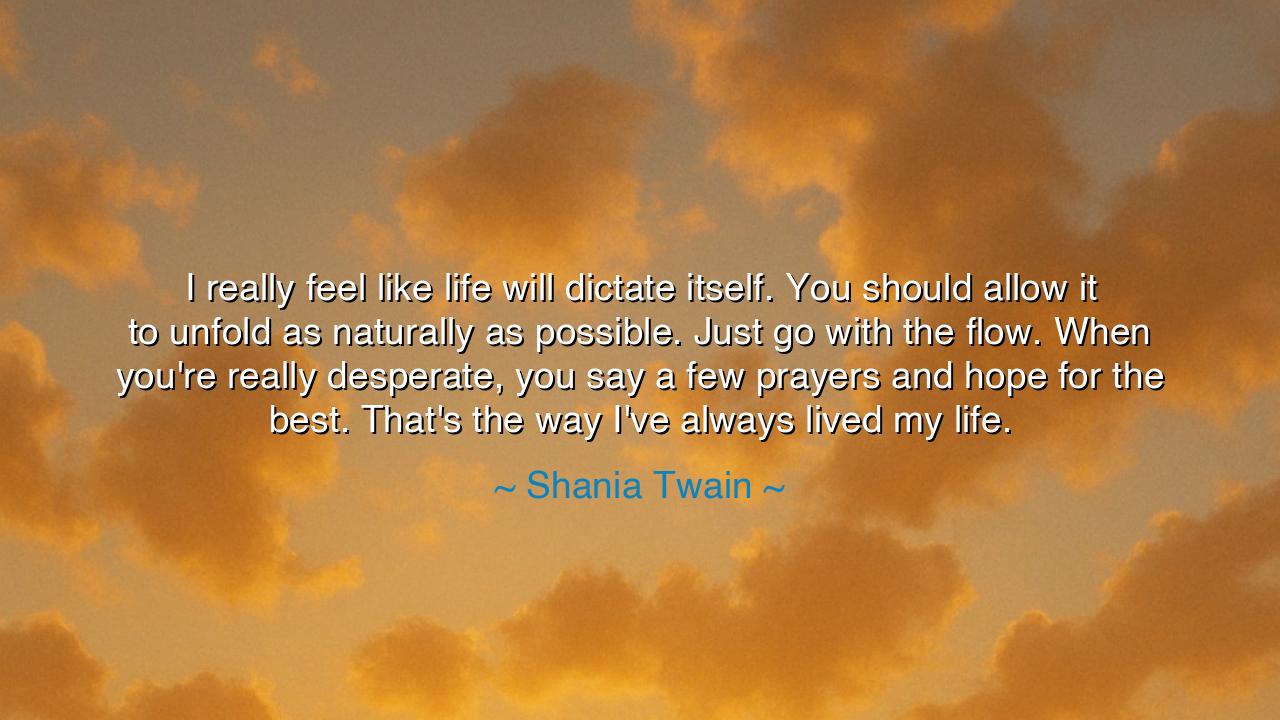
I really feel like life will dictate itself. You should allow it
I really feel like life will dictate itself. You should allow it to unfold as naturally as possible. Just go with the flow. When you're really desperate, you say a few prayers and hope for the best. That's the way I've always lived my life.






In the serene and grounded words of Shania Twain, the reflection — “I really feel like life will dictate itself. You should allow it to unfold as naturally as possible. Just go with the flow. When you're really desperate, you say a few prayers and hope for the best. That's the way I've always lived my life.” — carries within it the wisdom of acceptance, faith, and trust in the unfolding of destiny. It is the voice of one who has walked through storms and sunlight alike, and who has learned that control is often an illusion, while peace is found in surrender. Her words do not preach passivity, but rather the deep and ancient art of living in harmony with the currents of life, instead of fighting endlessly against them.
The meaning of this quote lies in its quiet strength. Twain reminds us that life, with all its twists and turns, is a force greater than our design. To live fully is not to script every moment, but to listen to the rhythm of existence, to move with it as a dancer moves with music she did not compose. The world teaches us to plan, to strive, to conquer — yet Shania’s wisdom tells us that the truest mastery comes not from domination, but from alignment. To “go with the flow” is not to drift aimlessly, but to trust that the river knows its own course. Even when the waters grow rough, there is a deeper current carrying us toward our rightful destination.
The origin of these words reflects the life of Shania Twain herself — a woman who rose from hardship to global fame, enduring loss, betrayal, and illness along the way. Born into poverty and tragedy, she faced the kind of trials that could have hardened her heart. Instead, she learned to bend, not break. Her philosophy of flowing with life was not born of ease, but of necessity — of learning that when the world turns uncertain, resistance only deepens suffering. Her faith, expressed simply in the act of saying a few prayers when desperate, is the faith of one who has known both power and helplessness, and who understands that both are part of the same divine cycle.
This lesson echoes through the stories of the ancients. Consider the sage Lao Tzu, who taught that “nothing is softer or more flexible than water, yet nothing can resist it.” His wisdom mirrors Twain’s belief: that by yielding, we do not lose strength — we gain endurance. Water does not fight the rock; it flows around it, over it, and through time, it wears even stone away. In the same way, those who move with the currents of life are not defeated by circumstance, but shaped into vessels of grace and resilience. Twain’s words, though modern in tongue, carry this same timeless truth — that gentleness and trust are stronger than rigidity and fear.
Her philosophy also speaks to the balance between effort and faith. Life demands that we act — that we work, create, and hope — but it also requires that we let go when our power ends. There is a point where striving must give way to surrender, where plans must yield to patience. Twain’s phrase, “when you’re really desperate, you say a few prayers,” is not an expression of weakness but of humility — the wisdom to know that some things belong to a realm beyond human control. In those moments, prayer becomes not a plea for miracles, but a way of opening the heart to peace amid uncertainty.
There is a deep heroism in this approach to life. To go with the flow is not to lack direction, but to trust that meaning reveals itself in its own time. Those who force life into rigid patterns often break when those patterns collapse, but those who move with grace — like wind through branches — remain unshaken. Twain’s life itself is a testament to this: when her voice was threatened by illness, she reinvented herself; when love betrayed her, she rebuilt her spirit. She did not escape pain, but she refused to let it define her. Instead, she allowed it to become part of her unfolding — one more note in the vast song of her existence.
Let this, then, be the lesson drawn from her wisdom: do not seek to master life, but to walk with it. When fortune is kind, move with gratitude; when hardship arrives, move with faith. Do what you can with what you have, and when the horizon disappears in fog, trust the deeper rhythm that guides all things. Life, like a great river, does not reveal its end from its beginning — yet it carries us all to the sea in time. To resist is to exhaust the soul; to flow is to find peace.
And so, my listener, remember the teaching of Shania Twain: “Let life unfold naturally. Go with the flow.” When the road bends unexpectedly, do not curse its curve. When despair darkens your way, whisper a prayer and keep walking. For the one who trusts the unfolding will find that life, though unpredictable, is also profoundly generous. The current may twist and surge, but it always carries those who trust it toward becoming — not what they planned, but what they were meant to be.






AAdministratorAdministrator
Welcome, honored guests. Please leave a comment, we will respond soon